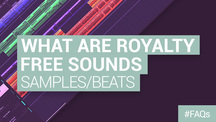What Are Royalty Free Sounds, Loops, Samples Or Beats?
With royalty free music and samples, you can say goodbye to managing copyrights, paying royalties, and wasting time. By buying an audio file one time, you automatically get a license to use that piece of royalty free audio material as you like it, as much as the license allows – and most of the time, that’s a lot!
Like it or not, music is a business. Anyone who creates original musical material – whether that’s whole songs, backing loops, or even just one-second samples for other people to use – owns the copyright for everything they make, meaning that you can’t use it without permission.

In almost every situation, getting this permission requires time and effort, and on top, you have to pay money in ‘royalties’ to the creator for each time the work is used. But there is another way: royalty free music.
So what is royalty free music, and what does royalty free mean? In a system more similar to publishing, creators can waive their rights to royalties, and sell their work for a one-time fee. In this system, buyers pay up-front for the audio material and are then free to use it in whatever way they wish, usually as much as they want. This simpler model of working and buying music and audio has led to dozens of publishers specialising in royalty free music, samples, beats and loops.
Where to find Royalty Free Music
Whole tracks, backing music
Audio Jungle
Audio Network
StockMusic.net
Premium Beat
Samples, Beats and Loops for Music Production
Loopmasters
Loopcloud
Why is Copyright so Important in Music?
Believe it or not, being a music producer used to be fraught with legal worries. When hip-hop emerged, producers used existing songs as the material to turn into new tunes. The result was an expressive art form that turned old beats and sounds on their heads to create new music. Every type of record was now fodder and inspiration for making new tunes.
But the unique attitude of sampling things created by others also caused problems. Using copyrighted material requires the permission of the copyright holder. And if you choose not to? Not clearing a sample could still cause a copyright dispute – and back payment royalty charges – years later.
Significant Music Sampling Copyright Cases
Vanilla Ice’s Ice Ice Baby used the guitar riff from Queen and David Bowie’s Under Pressure as its basis. Mr Ice Esq had to pay the popular 70s rockers between 2 and 3 million US dollars.
MC Hammer’s U Can’t Touch This sampled Rick James’ Super Freak. The case was settled out of court. Sales of Ready to Die by The Notorious B.I.G were halted by a judge due to a single uncleared sample.
Two Types of Copyright
One huge reason for the complications surrounding copyright is the different types of copyright that exist in the first place. When something is created or invented, one type of copyright applies to it; when it is recorded or sold, another applies in addition. The first is Publishing copyright – the intellectual copyright of coming up with the music (ie, the ‘thinking part’ such as the melody, its rhythm, and everything that makes it unique). The second is the ‘Master’ copyright, which is assigned to the musicians who played that work on recording, the producer of the recording and others.

The problems really get confusing here: this system of copyright used to work well, because a composer would come up with musical notes, lyrics and rhythms, while a performing musician would play them onto a record. Nowadays, if you’re experimenting with a synth in a DAW, you might be able to claim both types of copyright; but if you’re using samples of music that have been created by multiple people, it becomes harder to comply with your obligations under copyright law, with perhaps several separate royalty payments due for anyone recording you use.
Dealing with these terms may be in a day’s work for a record label, but if you’re an independent producer just starting out, it’s a complicated mess to get into. Using royalty free music samples can help you avoid just this sort of complicated situation.
Check the Terms
Despite what we’ve said so far in this article, the legal background behind copyright means that not everything will always be uniform. Some royalty-free websites have licence terms that look one way; others may have slightly or completely different terms.

For example, there may be no copyright payments due on a piece of music or a sample for use in a commercially sold tune, but that doesn’t necessarily mean that there are no royalties due if that piece of music is played on TV or another medium. Make sure you check the terms to ensure what you can and can’t do with a sample or piece of music.
Loopmasters Samples
All the samples we distribute are sold under the same agreement – that their use in your own music is royalty-free. Once you’ve paid for the sample collection itself, you can use it as part of a project in your DAW and as part of any commercial release with no conditions. The only limitation under the standard license is that you cannot re-sell those samples as samples, in the same way, that we do, or as part of an instrument that is also sold commercially.













